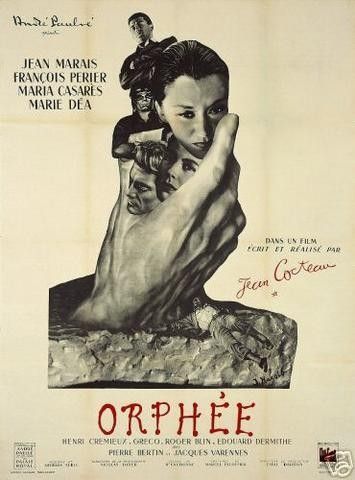"Orpheus" - Dir: Jean Cocteau, 1950
- Ravi Swami
- Feb 23, 2021
- 3 min read
Following a recommendation by a friend, who ranks Jean Cocteau's "Orpheus" near the top of a list of all-time favourite films, I decided to check it out on Apple +, and it's yet another critically acclaimed and widely-quoted film that I have never seen, though was aware of.
Based on the Greek myth of Orpheus, the film is a contemporary (to the early 1950's) re-telling of the story of the poet/musician Orpheus who has to travel to the Underworld ("Tartarus") in order to be reunited with his dead wife, Eurydice, and having been granted his wish he returns with her to the world of the living but under the condition that he can never look at her again, the punishment for breaking this rule being that he will be torn apart by the "Bacchantes" or "Maenads", the female followers of Dionysus.
The story varies in its' details according to different versions but Cocteau's plot follows this arc more or less.
Jean Marais plays Orpheus, a celebrated poet who is something of an outsider amongst a group of Left Bank intellectual types who frequent a cafe - much like Cocteau himself in real life - having fallen out of favour by marrying Eurydice (Marie Déa), a former member of a group of female intellectuals (the "Bacchantes" of the myth) led by "Aglaonice", played by 60's muse Juliet Greco.
The film opens with a brawl breaking out in the cafe after a mysterious woman (Maria Casares) arrives in a chauffeur-driven Rolls Royce with another young poet who is caught up in the brawl and then accidentally run over and killed by two motorcyclists who appear out of nowhere.
Orpheus, who has witnessed the terrible accident, is then commanded by the woman to accompany her in her car with the body of the dead poet and he complies, though against his will.
From this point on the plot takes a series of bizarre turns as it transpires that the woman is an emissary of death, perhaps Death itself, and her mission is to become united with Orpheus in the Underworld, after having arranged the death of Eurydice - the main deviation from the classical myth.
I watched the film 2 days after receiving the first dose of the Covid 19 vaccine and while the side-effects were minimal, I was aware of fever dreams - "Orpheus" is perhaps not the best film to watch in those circumstances due its' dream-like quality and contradictions whose meanings are hard to decipher on a first viewing.
The film features some inventive, and possibly never-bettered, visual effects, required to illustrate Orpheus' passage from the World of the Living to the Underworld, accessed by means of mirrors, and one particular mind-boggling sequence where Orpheus, accompanied by "Heurtebise", the chauffeur, who is actually a ghost - a rather inadequate description in the context of the story - appear to move along a wall that is part of set rotated through 90 degrees, bringing to mind similar scenes in Christopher Nolan's "Inception".
Part of a series - "The Orphic Trilogy" - the film was in part of a meditation on the life of a poet, or perhaps any artist, who has to undergo many "deaths" before being granted success almost as a boon and Cocteau resorts to visual metaphors that at first glance seem quite surreal, in the same way that in dreams details often never seem to make sense - Greek "Oracles" are substituted by messages being transmitted through the radio of the Rolls Royce, that Orpheus obsessively jots down in an attempt to decipher their meaning or because he believes them to be a more perfect form of poetry.
It's clear that film-makers that followed, including the burgeoning French New Wave, were hugely influenced by Cocteau's film, something that can be seen in the work Of Christopher Nolan and perhaps most notably in the pop-video directed by Steve Barron for Aha's "Take On Me" where the girl enters a comic book world via a cartoon panel and is chased by two motorcyclists dressed in 1950's style leathers - a direct nod to "Orpheus" that I wasn't aware of at the time I first saw it.
The film was also another opportunity to see the magnificent Maria Casares, here perfectly cast in a role that possibly inspired "Maleficient" in Disney's 1959 film "Sleeping Beauty", combining her strange beauty with real menace.











Comments